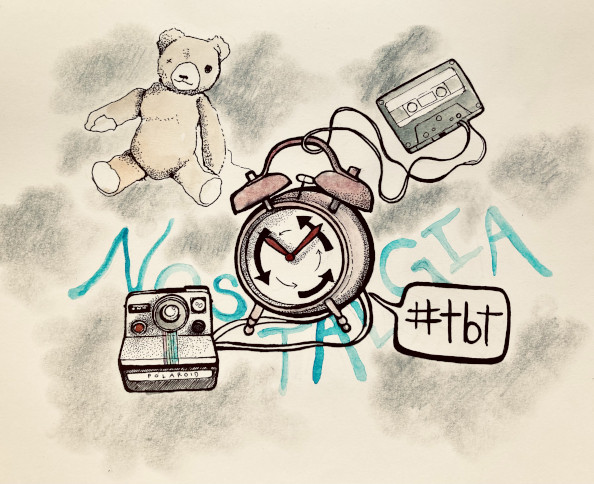Millennial blues
Foreigner Affairs

(Illustrated by Gabrielle Funk)
Recently, a very interesting video has been circulating various social-media platforms. In it, an older, seemingly wiser Steve from Blue’s Clues – the beloved television show many millennials grew up watching – gives a heartfelt speech about how proud he is of all that we, his now-adult viewers, have accomplished.
“We started out with clues,” he says, “and now, it’s what? Student loans and jobs and families. And some of it has been kind of hard.” To me, this seemingly innocent and uplifting message is one of the many indicators of a need for a nostalgic rush to save the current older-millennial generation from entering a void of pure nihilism.
In Postmodernism, or the Cultural Logic of Late Capitalism, Fredric Jameson defines postmodernism as a cultural moment involving a loss of historicity, depth and emotional affect. In his theory, he imagines culture at a crossroads, where people have determinately lost their ability to visualize the future.
Whether or not one agrees with Jameson’s definition, it is clear that contemporary culture struggles to grapple with the future and what it will hold. Unlike Jameson, I don’t believe that humans are unable to visualize the future. Instead, I think it is precisely because we have a good idea of what the future might hold for us that we often vehemently refuse to entertain such premonitions in the first place.
We would love for Steve to be right. We would love for terminated student loans, affordable housing and a loving, fully functional family of our own to either be a prominent part of our current lives, or something that’s right around the corner.
But the reality of the situation (for many Canadians) is that housing is becoming increasingly unaffordable. Student debt has become a similar problem, and people are
having fewer children.
The future is pretty easy for me to imagine, and I think many others in my generation share the same sentiment: one wherein we are soulless, childless, overly medicated and therapy-dependent individuals living in an economically unequal, globalized society with an expanded surveillance state.
The question remains: why is this video so popular? If my hypothesis is correct, and (at least) some part of us knows that the vision of the future Steve is offering is unduly optimistic, why can’t people get enough of this man coming back into their lives and blessing them with words of affirmation?
In my opinion: people actively infantilize themselves in order to soothe feelings of inadequacy that may be related to not reaching certain benchmarks of adulthood. In short, people revel in and dwell on the past, so they don’t have to think about the present or the future.
I believe this is why many adults read YA fiction, consume Marvel movies that are essentially made for children, watch cartoons or refuse to stop playing video games. I’m not exempt from this either. I still watch a fair share of cartoons from my childhood to feel a nice, calming rush of nostalgia. However, I want to understand why I feel the need to do so. Stretching the boundaries of youth in this way allows people to avoid asking themselves questions about why they don’t yet own a house, or why they aren’t economically capable of supporting a child. And just like that, 30 has become the new 20, with all the socioeconomic instability to boot.
Vinay is a fourth-year philosophy student at the University of Manitoba.
Published in Volume 76, Number 3 of The Uniter (September 23, 2021)






